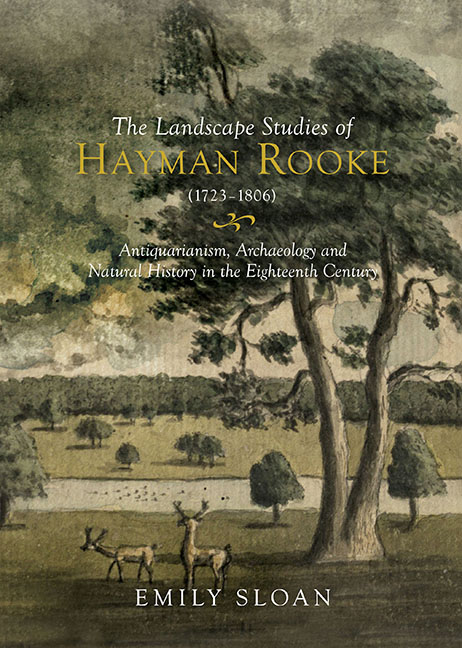 The Landscape Studies of Hayman Rooke (1723–1806)
The Landscape Studies of Hayman Rooke (1723–1806) Book contents
- Frontmatter
- Contents
- List of Illustrations
- Acknowledgements
- List of Abbreviations
- Introduction
- chapter 1 Rooke and His World
- chapter 2 Rooke and the Natural World
- chapter 3 Rooke and Ancient Britain
- chapter 4 Rooke and Roman Britain
- Conclusion Rooke and his Landscape Studies
- Appendix 1 List of Rooke's Publications
- Appendix 2 Reconstruction of Rooke's Diary
- Notes to the Text
- Bibliography
- Index
Conclusion Rooke and his Landscape Studies
Published online by Cambridge University Press: 31 August 2019
- Frontmatter
- Contents
- List of Illustrations
- Acknowledgements
- List of Abbreviations
- Introduction
- chapter 1 Rooke and His World
- chapter 2 Rooke and the Natural World
- chapter 3 Rooke and Ancient Britain
- chapter 4 Rooke and Roman Britain
- Conclusion Rooke and his Landscape Studies
- Appendix 1 List of Rooke's Publications
- Appendix 2 Reconstruction of Rooke's Diary
- Notes to the Text
- Bibliography
- Index
Summary
The growing interest in and acknowledgement of the networks within which knowledge was made has not, until now, been accompanied by an in-depth study of the nature of such networks among the antiquaries and the negotiations and influences which took place within them. As Livingstone has put it, ‘any historian of geographical ideas who lacks the impulse to integrate internal explanation and external context, who, in Glacken's words, “stays within the limits of his discipline sips a thin gruel because these ideas almost invariably are derived from broader inquiries”’. The breadth of Rooke's studies has demanded the incorporation of materials from art history, the history of science, exploration, natural history, meteorology, agricultural history, sociology and geography, revealing the relationships between these topics and some of their influence on each other. This has helped in contextualising the study of antiquarianism and contributed to an understanding of how antiquarian and natural historical practice functioned as a form of engagement with place.
REGIONAL STUDY
Whilst research was carried out in place, it contributed to both local knowledges and to a wider picture. Rooke's meteorological tables, for example, recorded the weather and unusual meteoric events in Mansfield Woodhouse, but he used his figures to compare rainfall and temperature from sites elsewhere in the Midlands and other parts of England. His identification of extremes of temperature may have fallen within the remit of the unusual and curious, recorded as part of chorographical practice, but Rooke's comparison of such fluctuations to mean seasonal temperatures for the nation provided a yardstick with which to view local changes relative to the national context. Local events were accompanied by extra details of the conditions prevailing at the time of the meteor, the hurricane or the unusual cloud formation; the depth of description was a way of contributing to the advancement of explanatory science.
Similarly, Rooke's excavations seem to have been undertaken not so much to uncover local distinctiveness as to glean what could be found out about ancient or Roman Britain more generally. Rooke's laborious and, in comparison with the work of even those of his peers who have been lauded for their technique, painstaking and careful excavations suggest a search for knowledge rather than the plundering of an ancient site for relics.
- Type
- Chapter
- Information
- The Landscape Studies of Hayman Rooke (1723–1806)Antiquarianism, Archaeology and Natural History in the Eighteenth Century, pp. 151 - 160Publisher: Boydell & BrewerPrint publication year: 2019


